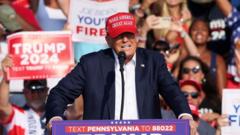South Africa's President Cyril Ramaphosa faced off against Donald Trump in the Oval Office, where Trump raised concerns about alleged 'white genocide' in South Africa. Ramaphosa's composed demeanor and his reaffirmation of the country's democratic integrity drew praise, as he sought to address complex issues of crime and safety affecting all South Africans.
Ramaphosa Stands His Ground Against Trump’s Accusations of ‘White Genocide’

Ramaphosa Stands His Ground Against Trump’s Accusations of ‘White Genocide’
In a heated Oval Office encounter, South African President Cyril Ramaphosa calmly responded to Donald Trump's claims regarding the plight of white farmers, navigating the intricate landscape of South Africa's political challenges.
In a recent confrontation, President Cyril Ramaphosa of South Africa faced off with US President Donald Trump in the Oval Office, where Trump made contentious remarks about supposed 'white genocide' in South Africa. Ramaphosa remained composed while countering these claims, bringing along a diverse delegation that reflected the multi-racial fabric of South African society. The encounter provoked mixed reactions, particularly from right-wing Afrikaner groups, who applauded Trump for his controversial stance, with some suggesting he should be awarded a Nobel Prize for raising concerns about farmers' safety.
Critics, however, expressed frustration with these groups for their alignment with foreign political figures against their own country. Amidst rising crime rates affecting all demographics, Ramaphosa emphasized that South Africa's challenges are not solely race-based but rather stem from broader issues of crime and economic instability. He was supported in his claims by local politicians, including John Steenhuisen, the leader of the Democratic Alliance, who highlighted the government's commitment to addressing safety across the board.
During the Oval Office meeting, videos surfaced of Julius Malema, leader of the leftist Economic Freedom Fighters (EFF), singing contentious protest songs that have caught the attention of both South African and foreign observers. This led Trump to question why these actions have not been curtailed, reinforcing the need for dialogue on political extremism in South Africa. While some Afrikaners feel increasingly alienated, with Trump offering asylum to those fleeing perceived threats, many South Africans, including prominent figures like billionaire Johann Rupert, stressed that the highest rates of violence disproportionately affect marginalized communities.
Trade union leader Zingiswa Losi echoed the sentiment that crime is fundamentally a national issue that transcends racial lines, urging collaborative efforts toward job creation and economic growth. As Ramaphosa deftly navigated the charged atmosphere, he invoked the memory of Nelson Mandela, reminding all present of the nation’s ongoing journey towards reconciliation and unity amid complex socio-political tensions.
Critics, however, expressed frustration with these groups for their alignment with foreign political figures against their own country. Amidst rising crime rates affecting all demographics, Ramaphosa emphasized that South Africa's challenges are not solely race-based but rather stem from broader issues of crime and economic instability. He was supported in his claims by local politicians, including John Steenhuisen, the leader of the Democratic Alliance, who highlighted the government's commitment to addressing safety across the board.
During the Oval Office meeting, videos surfaced of Julius Malema, leader of the leftist Economic Freedom Fighters (EFF), singing contentious protest songs that have caught the attention of both South African and foreign observers. This led Trump to question why these actions have not been curtailed, reinforcing the need for dialogue on political extremism in South Africa. While some Afrikaners feel increasingly alienated, with Trump offering asylum to those fleeing perceived threats, many South Africans, including prominent figures like billionaire Johann Rupert, stressed that the highest rates of violence disproportionately affect marginalized communities.
Trade union leader Zingiswa Losi echoed the sentiment that crime is fundamentally a national issue that transcends racial lines, urging collaborative efforts toward job creation and economic growth. As Ramaphosa deftly navigated the charged atmosphere, he invoked the memory of Nelson Mandela, reminding all present of the nation’s ongoing journey towards reconciliation and unity amid complex socio-political tensions.





















